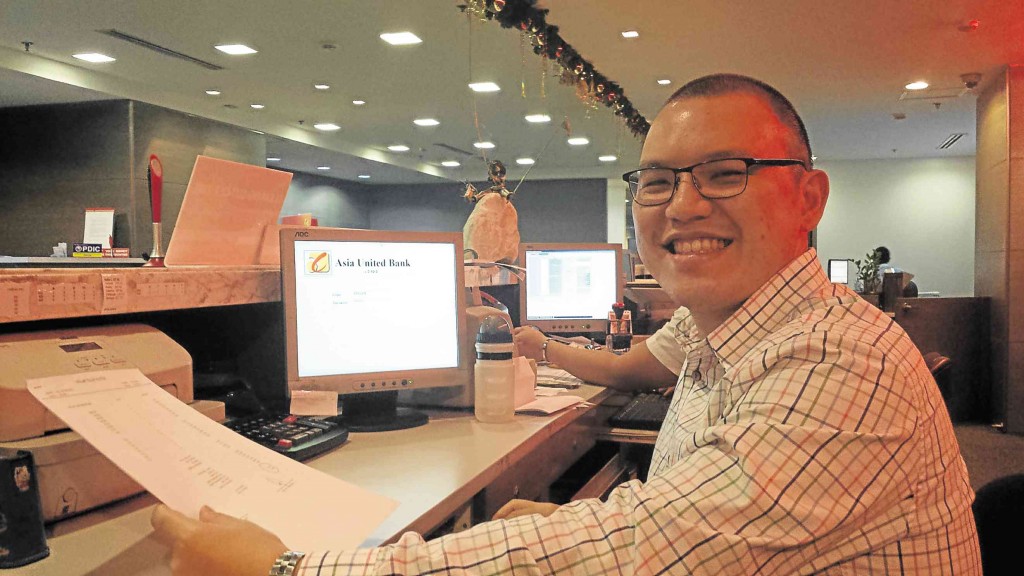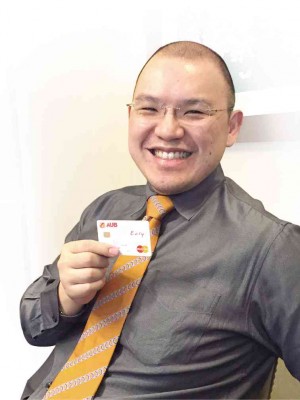Banking on the expertise of the prince of biscuits
When he was young, Jacob Ng always woke up to the aroma of freshly baked biscuits and the humming of the machines that mass-produced them.
His dad’s factory in Novaliches was literally his backyard—and playground—as his family used to live right where Republic Biscuit Corp. (Rebisco) manufactured these biscuits.
It was also there where the young boy first experienced handling money.
ATMs were not yet in vogue then, so little Jacob was trained to count the bills that went to the vouchers of Rebisco’s workers.
Now at 39, the youngest of the three sons of Jacinto Ng is chief transformation officer of Asia United Bank (AUB).
Article continues after this advertisementMentored by his dad as well as veteran banker and AUB president Abraham Co, the young businessman seems destined to become captain of the Rebisco group’s banking unit someday.
Article continues after this advertisementBig dreams
As his position suggests, Ng has big dreams for the bank. “Our goal is to be among the top five, asset-wise, in five to 10 years,” Ng says in an interview with the Inquirer.
This interview is actually his media debut but the young man seems to be a pro, appearing confident, comfortable and well-prepared to be quizzed on the bank and his role.
While recognizing that other banks are growing as well, Ng is confident that AUB will be a larger banking player in the years ahead.
But it has a long way to go.
As of end-September 2015, AUB had around P139 billion in total resources, ranking it the 15th largest among Philippine banks. Before its initial public offering (IPO) in 2013, it ranked 20th.
To match the asset base of the fifth largest player to date (PNB), AUB will need to quadruple its current size.
The country’s largest lender, Banco de Oro Unibank, recently exceeded P2 trillion in resources while the other big players—Metropolitan Bank and Trust Co., Bank of the Philippine Islands and Land Bank of the Philippines—now all have assets breaching P1 trillion.
In terms of distribution network, he says AUB aims to double its network to 400 branches in three to four years. The bank ended last year with 209 branches (employing 1,800) compared to 120 prior to its IPO. The thrust is to expand in key areas and make sure that each new branch opened will be profitable.
Ng also wants to improve AUB’s return on equity, eventually targeting 15 percent on a sustainable basis.
In the immediate term, however, Ng’s focus is to intensify AUB’s branding efforts while improving systems and processes mostly with the use of proprietary technology.
“Right now, vast majority of the Philippines do not know who we are. So I’m tasked with basically getting our name out there, let people know what AUB is and what we stand for,” Ng says. “On a deeper note, I’m supposed to transform the bank. You can’t just make a brand: You have to ensure that the organization is living up to the promises that you make.”
Empowering experience
The transformation that started in 2014 focuses on three Ps: people, products, and processes. The idea is that banks do not have to be cold, imposing, Ivory tower-type institutions that intimidate the average Filipino. AUB wants customers to feel that banking is not only essential to modern commerce and society, but that it can also be a pleasant and empowering experience.
“We’re not your run-of-the-mill bank. Everyone will say it’s customer-friendly and secure … What will enable us to deliver better service is our expertise in technology. All our systems are home-made, so it’s very easy for us to customize solutions to business needs that you may have. Couple that with highly trained staff who are customer-centric,” he says.
AUB was the first among its peers to roll out in its branches interactive machines that systematize queueing. While others have started using similar machines as well, AUB’s second-generation Virtual Teller Kiosk (VTK) can process more than the daily queueing done by machines used by other banks, Ng says.
Before a customer arrives at the branch, the banking transaction is queued and rendered valid for seven days and can be transacted in other AUB branches. “For instance, you queue in Quezon City, then after a few days, you’re already in Ilocos. Just show the reference number and there’s no need to queue,” he explains.
For people who don’t like their messengers to know how much is being transacted, they can give only the reference number and transact with confidentiality. The VTK now has three versions—one for the machines used in branches, one for PC and one for mobile devices.
AUB is also arguably one of the biggest players in the post-dated check (PDC) warehousing business as it handles the PDC warehousing of Housing Development Mutual Fund (Pag-IBIG). Its system allows the current account holder to monitor the checks online and likewise pull out checks online one day before clearing.
Since listing on the Philippine Stock Exchange in March 2013, AUB’s loan book has expanded at a compounded rate of 40 percent.
AUB has also transformed its business mix—reversing the 70-30 percent ratio previously skewed toward the treasury business. More than 70 percent of the business now comes from lending, which is mostly devoted to commercial accounts while 10-15 percent represents lending to consumers. Ng also seeks to grow lending to consumers and small and medium enterprises (SME) in a big way.
The bank debuted into credit card lending last year when it launched AUB Easy MasterCard, the first in the industry that allows cardholders to choose how much, how often, and even exactly when to pay their credit card bill. The bank initially targeted those without credit cards as well as cardholders who may have faced credit card trauma, bill shock, and other funding challenges from their existing cards. Recently, AUB has also rolled out its Platinum and Gold Mastercards with trail-blazing flexibility and more perks, targeting the high-end individual and corporate clientele.
AUB is now also talking to insurers for potential cross-selling opportunities and to beef up its trust and wealth management business “hopefully into something that will rival BDO Private Bank and Citibank,” Ng says. On cash management service for corporations, the package is called “Biz Kit”—likely an intended pun for “biscuit,” which, of course, created the family fortune.
He says financial inclusion is very much part of AUB’s banking agenda, saying the bank wants to reach out to underserved consumers among the working class, including those based overseas.
Easy Mastercard targets first-time credit card holders from the C and D income segments. Among its first customers were the waiters working for a restaurant in the same Ortigas building where the bank’s head office is located. The bank likewise offers a checking account without any maintaining balance, targeting real estate buyers who need to issue PDCs.
Proving his mettle
Ng holds a bachelor’s degree in AB Development Studies from the Ateneo de Manila University, where he graduated in 1998. He then went to the US for his MBA in International Management at the Thunderbird School of International Management in Arizona.
Fresh out of college, he helped out in the family’s real estate businesses (Extraordinary Development Corp. from 1998 to 2000 and Earth+Style Development Corporation from 2000 to 2003) and eventually enrolled in MBA school. He then went to Rebisco while processing his job application at Citibank.
All Ng sons were encouraged to work elsewhere first before handling greater responsibilities in the family business. “We had to prove our mettle,” he says.
Valuable experience
He joined Citibank as a management associate in 2005 and became a program manager, a position he held until 2007. He deems this two-year stint in a multinational corporation as a valuable experience—one that would prepare him for his current role.
“I have to be more disciplined. If you’re working for your own company, a lot of things can slide. When I was in Citibank, everything had to be proper and on time. There’s that discipline and the mind-set that whatever you want to happen, your ideas have to have basis. It’s not just what you want. You have to justify to business heads why,” he says.
Ng says he likes watching NBA and UAAP games, but these days, he is also learning to play golf (said to be bankers’ quintessential sport if they want to master deal-making in this market).
On his free time, he watches TV shows and movies with his family. He is happily married and a dad to two boys (ages five and two).
Ng’s dad, Jack, is a second generation Filipino-Chinese entrepreneur. He was born and raised here by immigrant parents who started out in the hardware business. But because he had so many siblings, Jack struck out on his own and saw an opportunity in the biscuit business over 50 years ago.
It all began as a neighborhood bakeshop in old San Juan, Metro Manila in 1963. Starting out as England Biscuit Factory, it produced flagship brands Crema (the first cream sandwich) and Sodatine (plain crackers). The company thereafter moved to a more spacious factory in Novaliches, Quezon City, in the same compound where Ng was raised as a child.
In 1972, the enterprise was rebranded as Rebisco. Over the years, Jack Ng diversified the business into real estate, banking and most recently, power generation.
All three Ng sons are involved in the family businesses. Only the youngest sister is not.
Asked what he has learned from his entrepreneurial dad, Ng says: “Watch out for your name. Lose everything but your reputation.”
“When I was two, our factory burned down, this was in San Juan. We lost almost everything so my dad had to get by. He had to borrow money. He’d say, ‘I’ll deliver products to you in 30 days’ time but give me the money now.’ Basically, he operated on the basis of trust that he can deliver the product in 30 days. He has always drilled that in—watch for your name and reputation.”
Think long-term, his father also taught him.
“When you encounter a problem, you have to think through it, not just to come up with a solution to the problem but to know the ultimate cause and come up with a long-term solution. (So that) as much as possible, it won’t happen again. It’s a three-step thing: think of an immediate solution, identify the cause and identify the permanent solution.”
He was also told to temper risk-taking.
“On risk-taking at the bank, always remember to protect the bank. When giving out commercial loans, think not just on how to get paid, but how we’re covered. What’s the collateral? What’s the reputation (of the borrower)? Look for your protection. As a bank, we’re not very aggressive. We’re very, very careful,” he says.
Ng is obviously up for a greater leadership role, given that at some point, AUB president Abra Co—who is now in his 60s—will also want to retire.
We asked this chief transformation officer if he’s being groomed to be the next CEO of AUB. This was his reply: “I will let you be the judge.”

